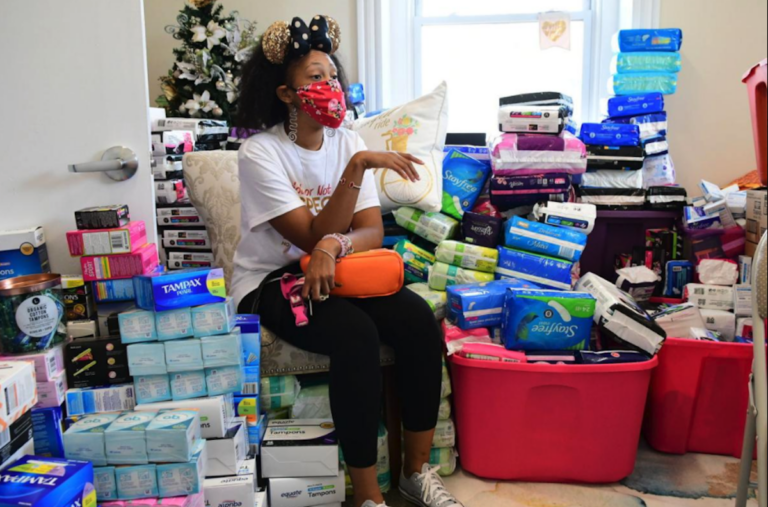Local nonprofit works to end period poverty
When Lynette Medley encountered women who were using newspapers and socks because they couldn’t afford menstrual supplies, she took action.

Nya McGlone is the executive director of No More Secrets Mind Body Spirit, Inc., an organization that seeks to address period poverty by providing women in need with free feminine hygiene products. (Abdul R. Sulayman / The Philadelphia Tribune)
This story originally appeared on The Philadelphia Tribune.
When Lynette Medley encountered women who were using newspapers and socks because they couldn’t afford menstrual supplies, she took action.
Medley established a bank of free feminine hygiene products and in-home delivery service in Philadelphia. She and her daughter, Nya McGlone, deliver the products to women in poverty throughout Pennsylvania, New Jersey and Delaware. They also ship products nationwide to those in need.
Since the pandemic began, they’ve seen an uptick in requests and are now delivering three-month supplies of pads and tampons to more than 200 households per week. When the mother-daughter duo started their work five years ago, they served between 80 and 100 households weekly.
“When COVID hit, it just really uncovered the layers of discrimination, the layers of poverty and the haves and have-nots,” said Medley, who is the founder and CEO of No More Secrets Mind Body Spirit, Inc.
As part of the CARES Act that Congress passed to help Americans financially hit by the coronavirus, women can use their flexible spending accounts to buy feminine products. However, Medley questions why similar provisions weren’t made for women on Medicaid. She said legislation is needed to ensure that menstrual supplies can be included in benefits for those women.
“That’s the least that I am asking for and then we can build on top of it,” said Medley, a sexual awareness educator and counselor.
“If Viagra and everything else is covered, [why] aren’t menstrual products covered? I know why. It’s because we live in a patriarchal society. If it doesn’t meet the needs of male-centered bodies, then it’s not brought to the forefront.”
One in four women have struggled to purchase menstrual products in the past year due to lack of income, according to the Alliance for Period Supplies.
Kiara Scott is a local resident who benefits from the products provided by No More Secrets. The 20-year-old Center City resident was recently referred to the nonprofit by her case manager. She appreciates the resources provided by the organization.
“I don’t have to go out of my way to get some pads every month,” she said.
In July, No More Secrets MBS launched the #BlackGirlsBleed campaign with a dual mission. They wanted to highlight the lack of support from major brands that manufacture menstrual pads and feminine products, and engage women in conversations about menses.
The Mount Airy-based organization relies on in-kind donations and works without government funding or corporate partnerships.
“We have had the worst time with brands and movements uplifting and supporting us,” Medley said. “We give out approximately 38,000 products a week, and brands will not support us because we’re a Black organization and because we service mostly Black communities.”
She’s also been unsuccessful in getting Black women’s health organizations and sororities to support her organization’s mission. Medley said the topic of menses is stigmatized among communities of color.
“So the second part of Black Girls Bleed was to de-stigmatize and normalize conversations around menses in Black communities,” Medley said. “The reason why it is not addressed in our community is because women are not talking about it.”
She is currently engaged in a pilot research project with Allison Casola, a postdoctoral research fellow in the Department of Family and Community Medicine at Thomas Jefferson University, on menstrual health experiences and communication norms among women in Philadelphia. They will conduct interviews with local women served by No More Secrets MBS.
“We’re going to be doing in-depth interviews with women in their communities to really capture their experiences and how they communicate with their friends and family, with their neighbors and other community members, as well as with their health care providers,” Casola said.
She said the project’s long-term goal is to develop community interventions to support the menstrual health experiences of women and decrease period poverty.
“The knowledge base in the United States specifically is very limited when it comes to menstrual health and hygiene and period poverty,” Casola said. “There is a lot of work being done internationally, but there is just as much need here in our backyard.”
WHYY is your source for fact-based, in-depth journalism and information. As a nonprofit organization, we rely on financial support from readers like you. Please give today.


![CoronavirusPandemic_1024x512[1]](https://whyy.org/wp-content/uploads/2020/03/CoronavirusPandemic_1024x5121-300x150.jpg)


